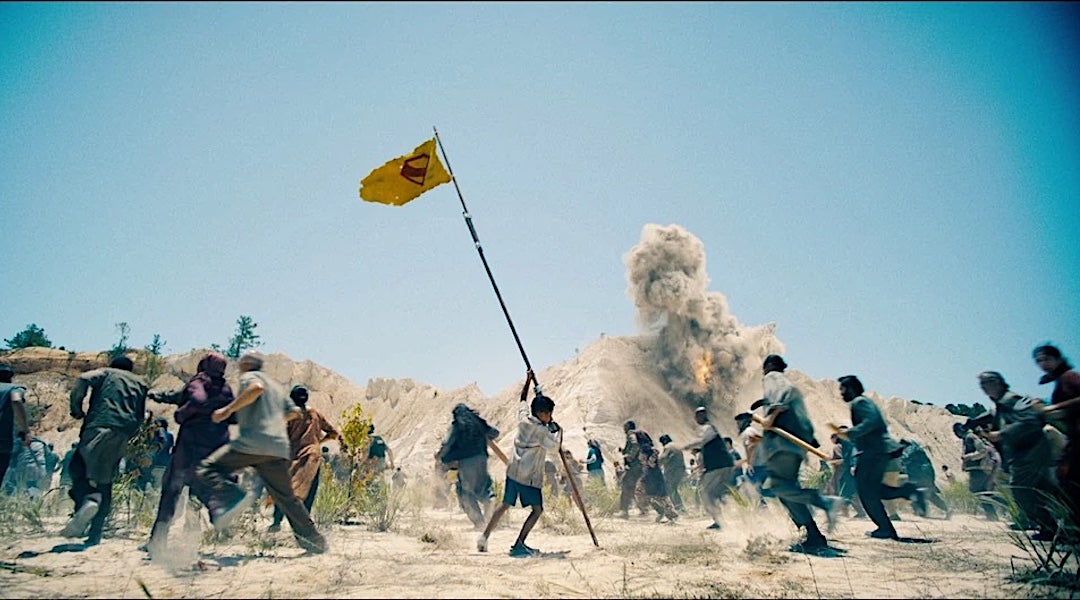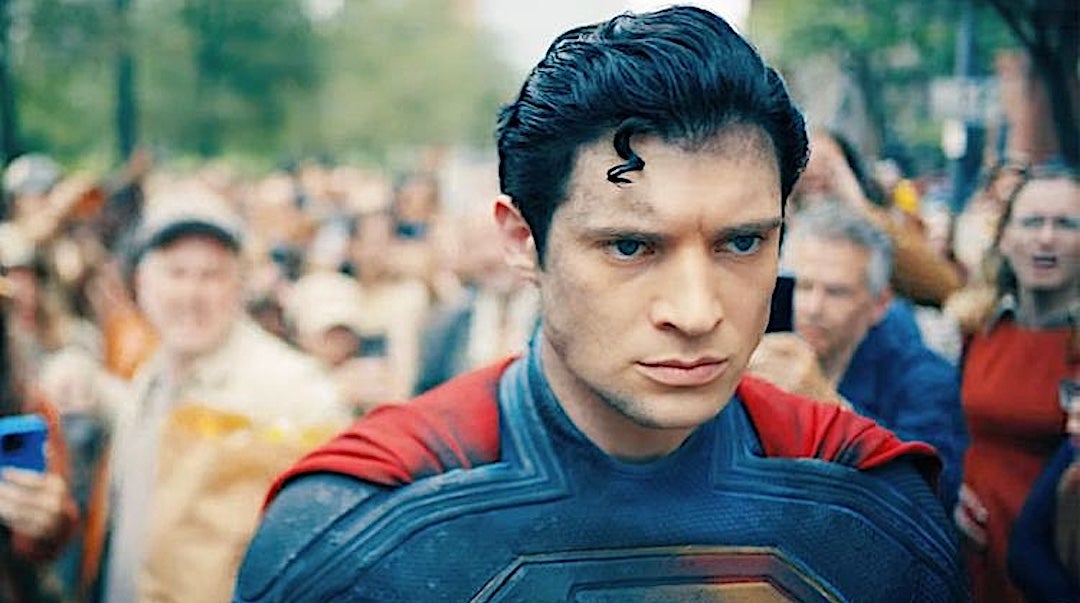An amateur film critic named Evan gave the new “Superman” movie five out of five stars. Writing on the Letterboxd platform, they praised the film’s “unique visual identity” and called director and screenwriter James Gunn “the best comic director.” And they added, “Very anti Israel which is awesome to see from a major studio blockbuster.”
When Evan’s capsule review was shared by at least one user on X, it garnered more than 11 million views and 36,000 likes.
Evan isn’t the only one to suggest that the new blockbuster carries an implicit — or even explicit — anti-Israel message. Social media has been buzzing with theories that one of the film’s major plot points — Superman’s mission to stop an invasion of a fictional impoverished country named Jahranpur by the U.S.-backed “Boravia” — is an allegory for the Israel-Hamas conflict.
“Feels like a major cultural moment that Israel is quite clearly the bad guy villain country in a big budget Hollywood movie,” wrote the political commentator and frequent Israel critic Krystal Ball on X. “Going in I thought it was subtle but it was not subtle at all.” Such messages were amplified in Arab and progressive media.
On Reddit, some supporters of Israel are critical of Gunn and D.C. Studios for seeding the film with an anti-Israel message. “I find it so disrespectful and distressing that a superhero created by two Jewish artists, is now being used to promote anti-Israeli messages to the world,” wrote a poster on r/Israel, a “subreddit” for supporters of Israel. What followed was a lengthy discussion of Gunn’s intentions and whether the film’s alleged pro-Palestinian bias is only in the eyes of the beholder.
Gunn has flatly denied that the film is a commentary on Israel or the Palestinians. “When I wrote this the Middle Eastern conflict wasn’t happening. So I tried to do little things to move it away from that, but it doesn’t have anything to do with the Middle East,” Gunn told Comicbook.com.
Gunn said the movie depicts an “invasion by a much more powerful country run by a despot into a country that’s problematic in terms of its political history, but has totally no defense against the other country. It really is fictional.”
Of course, no audience member needs a director’s, or anyone else’s, permission to interpret a film as they choose. And while the film is hardly a political screed, it has enough politics to keep such debates going. The villain, Lex Luthor, is an Elon Musk-style billionaire and military contractor who hopes to create a sort of technological paradise on the rubble of Jahranpur. Superman, who famously arrived on earth as a child from the planet Krypton, speaks up for immigrants of all types, including a falafel vendor named Malik Ali who helps Superman during his duel with a pro-Boravian supervillain — which has also been seized upon as evidence that the film is pro-Palestinian.
Boravia itself is clearly depicted as a Slavic country, with its wild-haired leader and his minions speaking in Russian. That might invite comparisons to Russia’s invasion of Ukraine, except for reports suggesting that the producers sought to cast “Middle Easterners” and southeast Asians as the Jahranpurians. The clash between the two countries — the invaders armed to the teeth, the defenders wielding pitchforks and shovels — is unmistakably a war between a Caucasian West and a brown-skinned East. That suggests to some that the Israeli-Palestinian comparison was intentional, although you could also see a director thinking a clash between white and brown worlds might have more emotional resonance and on-screen coherence than a battle between similar-looking Slavs, and would certainly be more relevant during the George Floyd era in which the script was apparently written.

A child from the fictional country of Jahranpur waves a makeshift Superman flag during an attack by troops from the fictional country of Boravia, in “Superman,” the 2025 film by James Gunn. (DC Stuios/Warner Bros.)
The climactic battle, when Boravian tanks and troops smash through a fence into a huge crowd of Jahranpurians, does not look like the Gaza war — or at least the urban war of the past two years. Instead, I was reminded of the 2018–2019 Gaza border protests, when Gazans held weekly demonstrations at the no-man’s-land between Israel and Gaza. Those clashes often turned violent; Israel responded with force, claiming that Hamas was using the demonstrations as a cover for attacks on Israel.
“Superman” wouldn’t be the first film to provoke outrage — and glee — over what may be unintentional messages. A number of films in recent years have used what many viewers saw as antisemitic tropes, for example: the goblin bankers in the “Harry Potter” movies, the villain in the Smurfs movies who torments the blue-skinned protagonists, Danny DeVito’s Penguin character in 1992’s “Batman Returns.”
There was no evidence that the creators of these movies intended such echoes, but that doesn’t mean they don’t exist: Pop culture is a constant churn of tropes and archetypes, often drawn from familiar narratives — biblical themes, Homeric epics, Arthurian legend. Superman himself, the creation of Jewish partners Jerry Siegel and Joe Shuster, is a recapitulation of the Moses story: a gifted child sent by his parents to safety in an alien land, where he becomes a hero. The creators even gave him a Kryptonian name — Kal-El — that not only sounds Hebrew but could be translated as “God’s voice.”
“Superman” the movie leans heavily into the idea, as old as David and Goliath, of a weaker neighbor fending off a powerful foe. If it were made 50 years ago, audiences would no doubt have seen parallels with the Vietnam War, or any of a number of post-colonial struggles. And it is not as if the United States hasn’t backed despots, from El Salvador to Nicaragua to the Philippines.
For many viewers, the Israeli-Palestinian conflict fits neatly into that paradigm, even as Israel’s supporters fiercely deny it. Israel, after all, was invaded by Hamas, not the other way around, while it is Israel that stands isolated among countries that have longed for its destruction. In “Superman,” the United States appears to back Boravia in part to sell and test sophisticated weapons devised by Luthor, a stand-in for the military-industrial complex; in real life, say Israel’s supporters, the United States is Israel’s closest friend out of shared democratic values.
“Superman” has gotten mostly positive reviews, in part because it weds the sensibility of Saturday-morning cartoons to some bigger ideas about power and populist politics. I understand why supporters of the Palestinians have enlisted the movie in their cause, and why supporters of Israel resent the comparison or even having to think about the war while watching an escapist summer blockbuster. But if it is any consolation — and I am not sure it is — the real-life war won’t be settled in social media threads or by men in tights, but through the actions and decisions of soldiers, politicians and they people they represent.
JTA has documented Jewish history in real-time for over a century. Keep our journalism strong by joining us in supporting independent, award-winning reporting.







